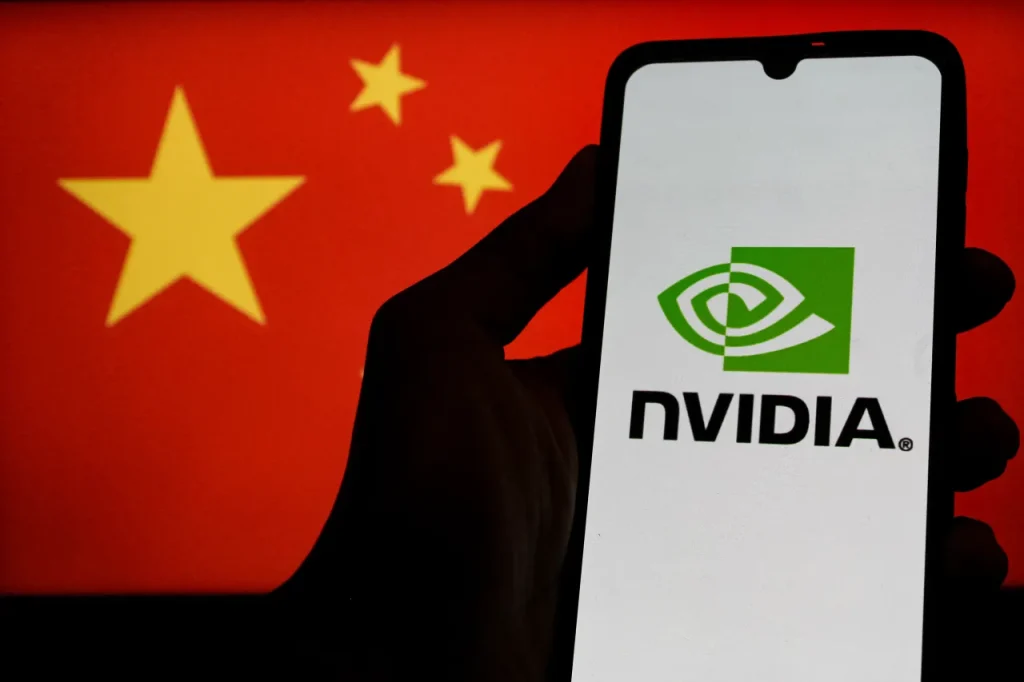Nvidia’s CEO Jensen Huang announced a major development that could trigger a significant rally in the company’s shares. The U.S. government has assured Nvidia that licenses for exporting its powerful H20 AI chip to China will be granted, effectively lifting the restrictive ban imposed in April 2025. This policy reversal follows Huang’s recent high-profile meeting with former President Donald Trump and marks a crucial turnaround after a tough few months for the semiconductor giant.
The H20 chip, designed specifically to comply with earlier U.S. export control rules, was barred from entering the Chinese market last spring, causing Nvidia to take a $4.5 billion write-down related to unsold inventory. Huang is currently in Beijing meeting key Chinese tech players and working with regulators and customers to jumpstart shipments once again. According to company statements, Nvidia is actively filing paperwork for export licenses and expects shipments to resume in the coming weeks.
This development is widely viewed as a big win for Nvidia, whose fiscal operations in China had been hit hard due to these export curbs and geopolitical tensions. The approval opens the door for Chinese tech giants, including Alibaba, Tencent, and ByteDance, who have shown strong demand for Nvidia’s AI computing platforms.
Impact on Nvidia’s Revenue and Chinese Tech Industry:
Nvidia might be able to recover a substantial amount of the $4.5 billion in lost sales associated with the April prohibitions if H20 AI chip shipments to China resume. Approximately 13% of Nvidia’s total revenues in the previous fiscal year, or $17 billion, came from the Chinese market. Large-scale data analytics, picture recognition, natural language processing, and other artificial intelligence workloads depend on the H20 AI processors for training and operation.
Chinese technology firms have reacted promptly to the news, rapidly seeking to get on Nvidia’s “whitelist” of approved buyers eligible to receive shipments. As reported by Reuters and other outlets, these companies recognize the current shortfall in domestically produced AI chipsets and view Nvidia’s products as essential to maintaining competitive advantage in AI development.
Huang has emphasized the strategic importance of the Chinese market for Nvidia’s global growth strategy. Speaking on Chinese state media, he stated, “China is a dynamic and highly innovative market, home to many leading AI companies. It is essential for American companies like Nvidia to establish roots here.” His Beijing visit this week, which aligns with a major supply chain and technology exhibition, aims to consolidate ties and reassure Chinese stakeholders.
New AI Chips and Compliance with U.S. Export Controls:
Nvidia introduced the RTX Pro GPU, a new product line designed especially for the Chinese market, in addition to approving the sale of H20 chips. This chip is made to completely adhere to U.S. export regulations and is intended for use in industrial AI applications like digital twin technology, smart factories, and logistics automation.
The RTX Pro, based on Nvidia’s Blackwell architecture, will offer competitive performance while meeting regulatory requirements outlined by U.S. authorities. The introduction of this chip signals Nvidia’s long-term commitment to providing compliant AI hardware solutions in a complex geopolitical environment.
Industry analysts view the dual strategy—resuming H20 exports and launching RTX Pro—as smart moves to maintain Nvidia’s dominance amid intensifying competition from domestic Chinese GPU makers such as Huawei. While these local firms continue to improve, Nvidia’s CUDA platform and advanced chip technologies hold significant market appeal.
Geopolitical Context and Future Outlook:
The timing of the U.S. government’s export license assurances to Nvidia follows a period of easing tensions between the United States and China. Recent diplomatic progress includes China relaxing rare-earth export restrictions and the U.S. restoring access to critical chip design software for Chinese companies.
While export controls remain a sensitive issue, Nvidia’s case highlights the possibility of market-driven solutions and regulatory dialogue that can mitigate the worst effects of trade restrictions. CEO Jensen Huang’s meetings in both Washington and Beijing underscore his active efforts to navigate complex policy landscapes.
Nvidia acknowledged that the export curbs had forced it to write off $4.5 billion in inventory, and estimates suggest lost sales could total $15 billion due to restrictions on its Chinese market. A successful restart of shipments would not only improve revenues but also boost investor confidence. Nvidia shares surged over 4% in pre-market trading upon news of the license approvals, reflecting optimism over reopening this vital market.
Nvidia plans to closely monitor compliance with U.S. regulations while continuing to innovate and expand its product portfolio to meet global demand. The company remains mindful of U.S. government scrutiny about national security concerns linked to AI technologies and export controls.
A major victory for Nvidia, the restart of H20 AI chip shipments to China strengthens the company’s leadership in AI hardware and its capacity to adjust to changing geopolitical conditions. New AI chips are being developed, and shipments are expected to begin soon. Nvidia’s CEO, Jensen Huang, and his team are setting up the company for future growth and market resilience.

